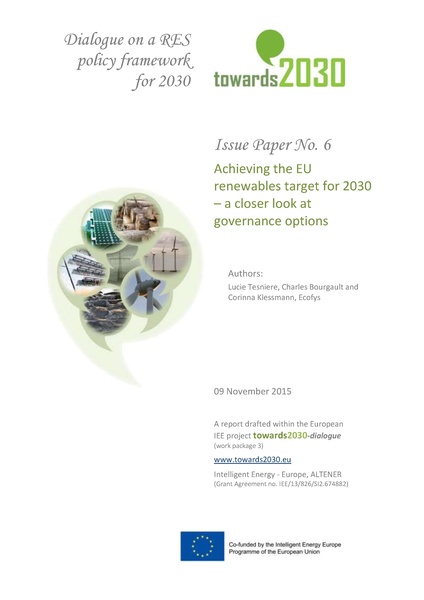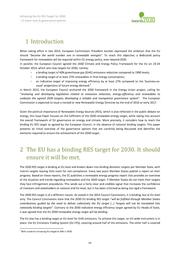Click here to register!
File:Towards 2030 - Achieving the EU RES Target for 2030 - Issue Paper No. 6.pdf
 Size of this JPG preview of this PDF file: 424 × 600 pixels. Other resolution: 170 × 240 pixels. |
Original file (2,480 × 3,508 pixels, file size: 0 bytes, MIME type: application/pdf, 9 pages)
Summary
| Description |
English: When taking office in late 2014, European Commission President Juncker expressed the ambition that the EU should “become the world number one in renewable energies”. To reach this objective, a dedicated policy framework for renewables will be required within EU energy policy, even beyond 2020.
In parallel, the European Council agreed the 2030 Climate and Energy Policy Framework for the EU on 23-24 October 2014, which sets new targets for 2030, namely: - a binding target of 40% greenhouse gas (GHG) emissions reduction compared to 1990 levels; - a binding target of at least 27% renewables in final energy consumption; - an indicative target of improving energy efficiency by at least 27% compared to the ‘business-as-usual’ projections of future energy demand.1 In March 2015, the European Council anchored the 2030 framework in the Energy Union project, calling for “reviewing and developing legislation related to emissions reduction, energy-efficiency and renewables to underpin the agreed 2030 targets; developing a reliable and transparent governance system”. The European Commission is expected to issue a revised or new Renewable Energy Directive by the end of 2016 or early 2017. Given the political importance of Renewable Energy Sources (RES), which is also reflected in the public debate on energy, this Issue Paper focuses on the fulfilment of the 2030 renewable energy target, while taking into account the overall framework of EU governance on energy and climate. More precisely, it considers how to reach the binding EU RES target as agreed by the European Council, in the absence of national binding targets. This paper presents an initial overview of the governance options that are currently being discussed and identifies the elements required to ensure the achievement of the 2030 target. |
|---|---|
| Source |
Own Work |
| Date |
2015-11-09 |
| Author | |
| Permission |
See license tag below. |
Licensing
|
File history
Click on a date/time to view the file as it appeared at that time.
| Date/Time | Thumbnail | Dimensions | User | Comment | |
|---|---|---|---|---|---|
| current | 16:01, 9 November 2015 |  | 2,480 × 3,508, 9 pages (0 bytes) | ***** (***** | *****) | User created page with UploadWizard |
You cannot overwrite this file.
File usage
The following page uses this file:




















